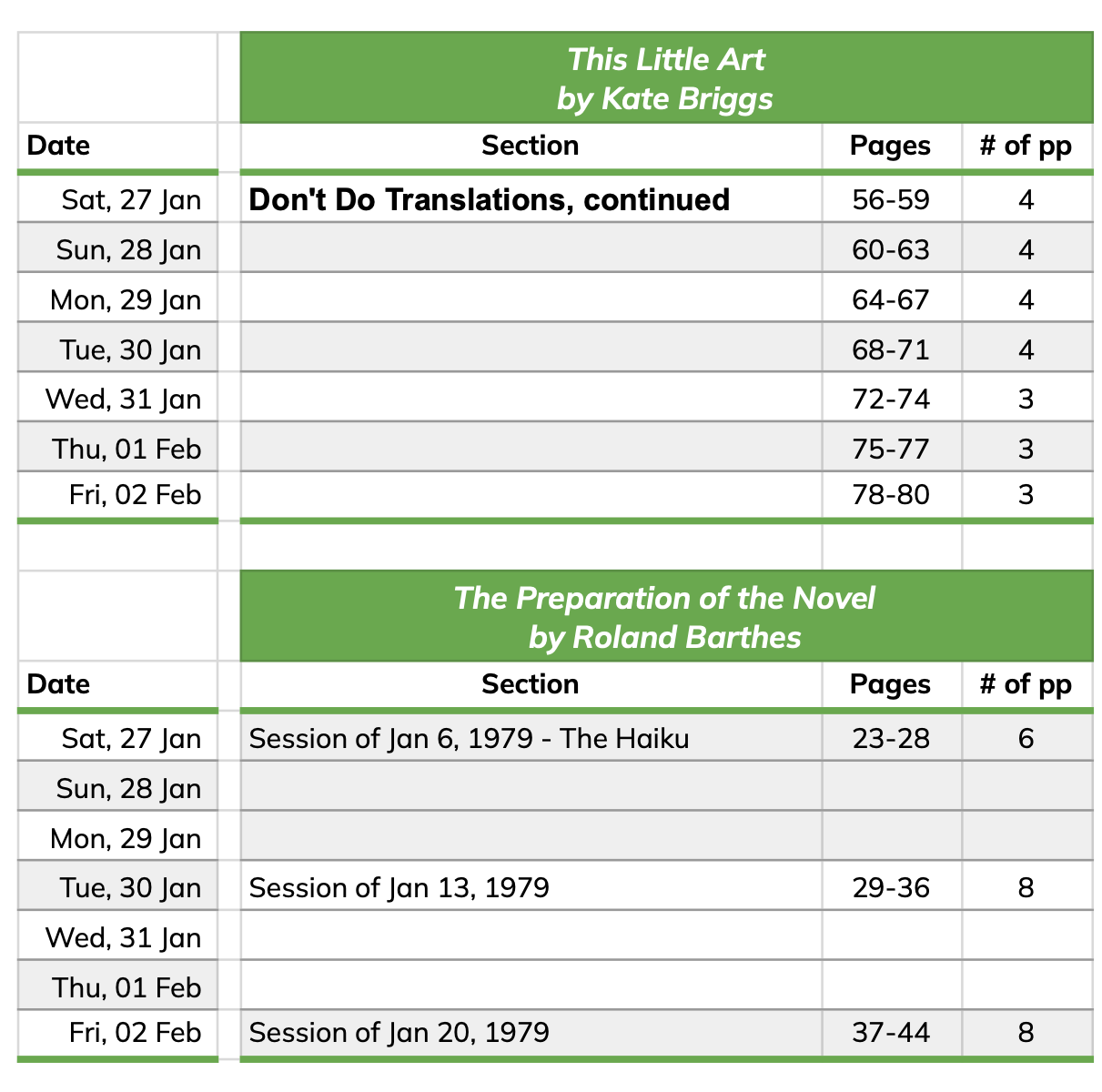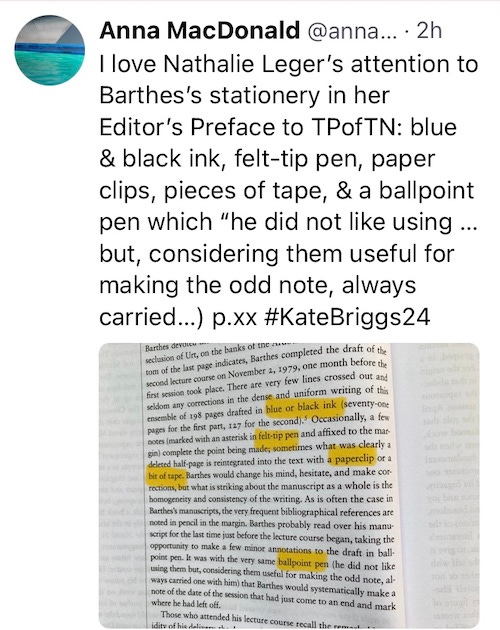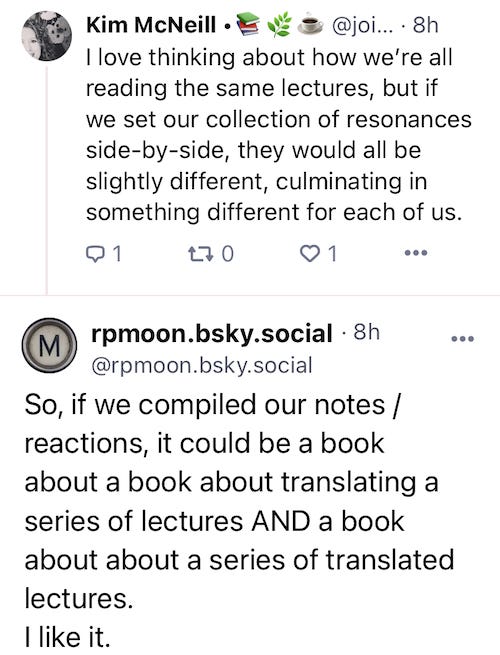#KateBriggs24 Week 3
"Don't Do Translations," cont., and Sessions of January 6th, 13th, and 20th
Let me just say that I LOVE reading your tweets, posts, and comments about this project! Please don’t miss the comments people have left on the first two weeks (Week 1, Week 2). If you are on social media, you can follow the discussion on Twitter and Bluesky, and if you’re not, I rounded up some of the discussion below.
A special thank you to all who are participating in this project but aren’t posting about it — we appreciate you too!
If you come across books, articles, podcasts, films, or whatever that are relevant to this project, feel free to let Kim and I know and we will put them in the newsletter and on the website.
Below you will find our schedule for Week 3, a whole bunch of links (many of them contributed by participants), and bits of the discussion.
First, make sure to follow Adam James Smith (also on Bluesky) for gorgeous photos such as this one:
Schedule
Here’s what we are reading for the upcoming week:
Resources
Mary Cappello has a book-length essay called Lecture, which, while I haven’t read it, sounds very relevant to our Barthes interests.
Cathie Grimm posted a Jacques Brel clip in honor of Barthes’s mention of him on p. 5 of The Preparation of the Novel.
Cathie also pointed me to this post about Helen Lowe-Porter by Jo Salas, author of a novel about the translator.
Rebecca Cullen linked to this post by Katherine May on her preparation for the novel (or nonfiction in her case).
Kim pointed me to this letter by Thomas Mann about Helen Lowe-Porter and her translation.
On p. 27, Briggs mentions an essay called “He Stuttered” by Gilles Deleuze.
On p. 58, Briggs references Edith Grossman and her book Why Translation Matters. You can read an excerpt the book on Words Without Borders.
Briggs’s footnote to p. 63 mentions “The Making of a Tireless Literary Translator,” an article about translator Megan McDowell by Nathan Scott McNamara.
You can find the interview with Gayatri Chakravorty Spivak Briggs mentions on p. 78 at LARB: “Critical Intimacy: An Interview with Gayatri Chakravorty Spivak,” conducted by Steve Paulson.
As always, check out my co-coordinator Kim McNeill’s website with many links that you will find useful, including books and articles referenced in our reading so far and our full reading schedule.
Discussion
A couple people have written their thoughts up at length (I love it!):
Rebecca Cullen wrote a great post on Substack about This Little Art and her experiences translating Greek.
Liz McCausland wrote a blog post about translation and “Illusion Sleeves.”
And here are some social media posts that caught my eye:
From Nicholas Greco:
From Cathie Grimm:
From Deidre Lynch:
From Catherine Eaton:
From Vanessa Smith, also on the ephemeral:
From Anna MacDonald:
From Kim McNeill and rpmoon:
Thank you all for this wealth of ideas, responses, and musings, for your beautiful photos and helpful links, and, most of all, for your enthusiasm!
Rebecca and Kim
Find Kim on Twitter, Bluesky, and Instagram*
Find Rebecca on Twitter, Bluesky, and Instagram*
*Our Instragram accounts are locked, but we welcome bookish friend requests













TLA, p. 56-59: Do translations!
I don't think I'll do translations -- so much time required! -- but I do love Briggs's invitation, which makes me want to devote the time to translation, even if I don't actually have it.
I'd forgotten that Brexit is in the background of TLA, or the foreground in the pages for today. What a contrast, the openness of Briggs's invitation to translate, and the closed-off nature of Brexit. Briggs values the contact translation brings, and she always emphasizes the body in translation -- the hands that translate -- and she values how travel facilitates translations. How sad that Brexit can make that contact harder! How sad to look back and see that what she took for granted is under threat. I can feel the sadness and anger, even though Briggs doesn't dwell on it.
Barthes, Session of Jan. 6th: I'm curious about his side note that some people have accused his lecture course of being narcissistic. It doesn't feel that way to me! Yes, he uses his interests and desires -- his fantasy -- to shape what he says, but at least he's upfront about that. I think we all begin with our personal interests and desires, but we aren't always honest about it.
I like what Barthes says about haiku as equivalent to a word, as a fundamental unit, and I'm thinking about his idea of "aeration" -- the space around each haiku, in relation to the way Briggs uses white space. She certainly cares about giving her blocks of text, her units, the space they need to allow the reader to breathe. I wonder how much of her use of white space comes directly from Barthes, and/or from elsewhere. And my eye is drawn to the short sections as I flip through TLA or look to see what it coming up in the next few pages. I find it nearly impossible not to read the short sections that are in the next day's reading.
There's SO MUCH in the latest Barthes reading, the Session of January 20th. The weather as an underestimated topic (yes!) -- how talking about the weather can mean such different things depending on who you are talking to.
The weather as a "deficiency of language (of discourse) that is precisely what's at stake in love: the pain at no longer being able to talk about the Weather with the loved one. Seeing the first snow and not being able to tell them, having to keep it to yourself." Always, it seems, Barthes's feelings are near the surface, or they are the surface; I think of the loss of his mother. This passage is beautiful!
How weather operates in haiku: haiku "situates itself on the quietly surprising border between the code (of the season) and the weather (as it's received, spoken, by the subject: a season's precocious awakenings, the languidness of a season drawing to an end." Gorgeous.
Involuntary memory, or satori, which, in Proust, produces extension (length) and in haiku, remains a bud, or a stone in water. It's sound only, not ripples.
One of my favorite passages from this session: "I've nothing to add other than this: anyone who has lost someone dear to them retains a painful memory of the season; the light; the flowers, the smells, the harmony or discrepancy between mourning and the season: how it's possible to suffer in the sun! Bear that in mind as you leaf through travel brochures!" A bit of humor, with deep sadness behind it.
Finally, the thoughts on subjectivity, which is possibly more like "a discontinuous (and yet unabrupt) mutation of sites (cf. Kaleidoscope)" rather than a river, even one that changes constantly. Individuation both strengthens the subject and "undoes, multiplies, pulverizes, and in a sense absents the subject."